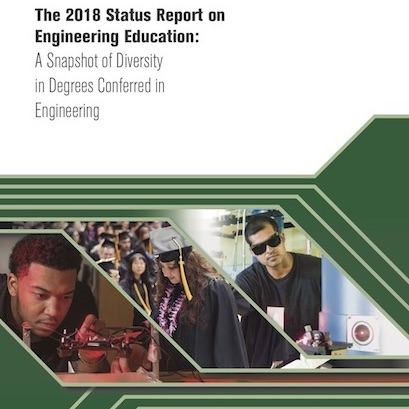Report Urges Greater Efforts to Boost Opportunities for African Americans in Doctoral Programs
In 1980, Black doctoral earners received about 40 percent of the doctorates they would have received if the percentage of doctorates equaled the Black percentage of the population. There has been significant improvement in the share of doctorates awarded to Black people, now at about four-fifths of what racial parity would call for. But more wok needs to be done.
The Large Racial Gap in Educational Attainment Rates, Particularly for Men
In 2021, 28.7 percent of African Americans over the age of 25 had obtained at least a bachelor's degree. For Whites, the figure was 41.9 percent. White men were nearly twice as likely as Black men to hold an advanced degree.
The Very Wide Racial Gap in College Graduation Rates
New data from the U.S. Department of Education shows that nearly 68 percent of all White students entering four-year colleges seeking a bachelor's degree in 2015 had graduated within six years. But only 45.7 percent of Black students had earned a bachelor's degree within six years. The racial gap was even larger at price, not-for-profit colleges and universities.
Academic Disciplines Where African Americans Received Few or No Doctorates in 2021
African Americans earned only 1.4 percent of all doctorates awarded in mathematics and 1.2 percent of all doctorates in physics that were awarded to U.S. citizens and permanent residents in 2021. Blacks earned 4 percent of all doctorates in computer science, 4 percent of all doctorates in chemistry, and only 4.1 percent of all doctorates awarded in engineering disciplines.
The First Black Woman to Earn a Ph.D. in Biomedical Engineering at Vanderbilt University
Dr. Carcia Carson intends to devote her professional career to developing translational research in cancer vaccines and personalized immunotherapy.
Student and Faculty Diversity Reduces the Black-White College Graduation Rate Gap
A study led by Nicholas A. Bowman, Mary Louise Petersen Chair in Higher Education at the University of Iowa, finds that college graduation gaps between Black and White students tend to shrink when there are more students of color or faculty of color on campus.
Academic Fields Where No African Americans Earned Doctorates in 2020
African Americans earned just 2.1 percent of all doctorates awarded to U.S. citizens and permanent residents in the physical and earth sciences and 3.2 percent of all doctorates in mathematics and computer science. There were 17 fields where no African Americans earned doctorates.
Research Doctoral Degrees Awarded by Historically Black Universities in 2020
Data for the annual Survey of Earned Doctorates from the National Science Foundation shows that 482 doctorates were awarded by historically Black colleges and universities in 2020. Thus, HBCUs conferred just under 0.9 percent of all doctoral degrees awarded in the United States in 2020.
Doctoral Degrees for African Americans Hold Steady Despite the Pandemic
Universities in the United States conferred 55,283 doctorates in 2020, down just slightly from 2019. Of these, 3,095 were earned by Black students, up slightly from the previous year. But more than one fifth of all doctorates earned by Black students at U.S. universities went to foreign students.
The First Black Woman to Earn a Ph.D. in Judicial Studies in the United...
Dr. Tobi-Aiyemo currently resides in New York City. She retired from the Lagos State Judiciary bench in Nigeria in 2019. She began the Ph.D. program six years ago and completed her studies with a dissertation entitled “The Role of the Nigerian Judiciary in a Democracy: A Judge’s Dilemma.”
Alcorn State University in Mississippi Graduates Its First Class of Doctoral Students
Six family nurse practitioners recently became the inaugural Doctor of Nursing Practice class at the Cora S. Balmat School of Nursing at Alcorn State University in Mississippi. All six of the graduates had earlier received a master’s degree in nursing from the university.
University of Georgia Program Aims to Boost Black Male Retention and Graduate Rates
The Georgia African American Male Experience (GAAME) started in 2014 as a two-day transition program for Black males accepted into the University of Georgia. The program has grown into a multifaceted initiative that centers on the needs of Black male students, supporting and improving retention and graduation rates.
Census Study Shows a Small Increase in the Racial Gap in Bachelor’s Degree Attainments...
For the years 2015 to 2019, on average 21.6 percent of African Americans over the age of 25 held a bachelor's degree. For non-Hispanic Whites, the figure was 35.8 percent. This racial gap is slightly large than was the case in the period from 2005 to 2009.
Racial Differences in the Age of Doctoral Degree Recipients in the United States
On average, Whites who earned doctorates were 31.6 years old when they received their doctoral degrees. For African Americans, the average age was 36.1. But when we break the figures down by age group, we see more pronounced differences.
Academic Disciplines Where African Americans Received Few or No Doctorates in 2019
In 2019 there were 2,512 African Americans who earned doctorates. They made up 7.1 percent of all doctorates awarded to U.S. citizens or permanent residents in the U.S. But there are many fields where Blacks earned only a tiny percentage of all doctorates. For example, African Americans earned only one percent of physics doctorates.
The 21 Historically Black Universities That Awarded Doctoral Degrees in 2019
All told, 21 HBCUs awarded doctoral degrees in 2019. This is the same number of doctoral degree-granting institutions as five years ago in 2014. That year HBCUs awarded 448 doctoral degrees. In 2019, HBCUs gave out 437 doctorates.
African Americans Making Slow but Steady Progress in Doctoral Degree Awards
There were 2,512 African Americans who earned doctorates in 2019. They made up 7.1 percent of all doctorates awarded to U.S. citizens or permanent residents in the United States. Women made up 64.3 percent of all African Americans earning doctorates in 2019.
Graduation Rates of Students at State-Operated Historically Black Universities
A few of the nation's private historically Black colleges and universities have achieved progress in graduating their Black students. But at most of the nation's state-operated historically Black colleges and universities, the graduation rates remain very low.
The Persisting Racial Gap in College Graduation Rates at Flagship State Universities
At 21 flagship state universities in states with large Black populations, 15 have a racial graduation rate gap of 10 or more percentage points. The widest gap is at the University of Mississippi. There the Black graduation rate of 42 percent is 23 percentage points below the rate for White students.
Grading the Nation Top-Ranked Universities on Graduating Their Black Students
All of the 20 highest-ranked universities in the United States according to ratings by U.S. News & World Report have Black student graduation rates far higher than the national average of 48 percent. Harvard has the highest rate at 98 percent, followed by Yale and Princeton.
The Historically Black Collges and Universities Awarding the Most Bachelor’s Degrees
North Carolina A&T State University in Greensboro awarded 1,662 bachelor's degrees, the most of any HBCU. This is not surprising since North Carolina A&T State University has the largest number of undergraduate students among HBCUs.
University of Memphis Launches The African American Male Academy
Starting in middle school, the initiative will identify, recruit, and induct African American male students into a culture of inclusive excellence. These students will be set on a path toward college completion.
Major New Report on the Status and Trends Relating to African American Education
Most of the information is contained in other federal reports, but the 228-page report is useful as it collects data on African American educational attainment at all levels in one place.
Academic Fields Where Blacks Earn Few or No Doctoral Degrees in 2017
African Americans earned only 1.2 percent of all doctorates awarded in physics to U.S. citizens and permanent residents in 2017. Blacks earned 0.9 percent of all mathematics and statistics doctorates, and only 1 percent of all doctorates in computer science.
African Americans Making Slow Progress in Engineering Degree Attainments
A new report from the Association of Public Land-grant Universities found that Blacks earned 3.9 percent of all bachelor's degrees in engineering in 2016. They received 2.2 percent of all master's degrees awarded in engineering fields and 1.9 percent of all Ph.D.s in engineering that year.
The Universities Awarding the Most Doctoral Degrees to Black Scholars
During the five-year period from 2013 through 2017, 11,389 Black or African American students earned doctoral degrees at colleges and universities in the United States. Walden University awarded 969 of these, by far the most of any educational institution.
African Americans Making Only Snail-Like Progress in Doctoral Degree Awards
If we restrict the figures to citizens and permanent residents we find that African Americans earned 6.7 percent of all doctoral awards in 2017. Therefore, African Americans earned about one half the number of doctorates that would be the case if racial parity with the U.S. Black population prevailed.
The Gender Gap in College Completion Rates for African Americans
For African Americans who entered four-year colleges and universities seeking bachelor's degrees in 2011, women had a graduation rate of 43.9 percent, compared to 34.1 percent of Black men. This was the largest gender gap for any racial or ethnic group.
A Major National Initiative to Close the College Achievement Gap by 2025
The Association of Public and Land-grant Universities has organized a collaborative effort in which 130 public universities and systems will work together to increase college access, close the achievement gap, and award hundreds of thousands more degrees by 2025.
The Gender Gap in Degree Attainments Among African Americans
There is a major gender gap in degree awards at all levels among African Americans. In the 2016-17 academic year, Black women earned 66.9 percent of all associate's degrees, 64.1 percent of all bachelor's degrees, 70.1 percent of all master's degrees, and 68.4 percent of all research doctorates awarded to African Americans.
New Data on African American Degree Attainments in the United States
During the 2016-17 academic year, African Americans earned more than 349,000 degree awards at four-year U.S. postsecondary educational institutions. Blacks earned 9.6 percent of all bachelor's degrees, 10.2 percent of all master's degrees, and 8 percent of all research doctorates.
The Education Trust Examines African American Degree Attainments by State
Just over 40 percent of Black adults in New Mexico have earned a higher education degree, the highest rate in the nation. The state with the lowest level of degree attainment for African American adults is Louisiana.
New Report Examines Racial Disparities Among Those Who Have Completed College
There have been a great number of studies done on racial disparities in access to - and graduating from - college. But a new report from the Center for American Progress finds that there are large racial disparities that exist even among those who complete college.
Fields Where African Americans Earn Few or No Doctoral Degrees
Blacks are vastly underrepresented among doctoral degree recipients in some disciplines. For example, in 2016 African Americans earned only 1.8 percent of all doctorates awarded in physics to U.S. citizens and permanent residents.
Doctoral Awards at Historically Black Colleges and Universities
National Science Foundation data shows that historically Black colleges and universities awarded 432 doctorates in 2016. This was 0.8 percent of all doctorates awarded in the United States. Howard University leads the list with 93 doctoral awards.
The Persisting Racial Gap in Doctoral Degree Awards
African Americans earned 6.6 percent of all doctoral degrees awarded to students who are U.S. citizens or permanent residents of this country. Thus, African Americans earned about one half the number of doctorates that would be the case if racial parity with the U.S. Black population prevailed.

































